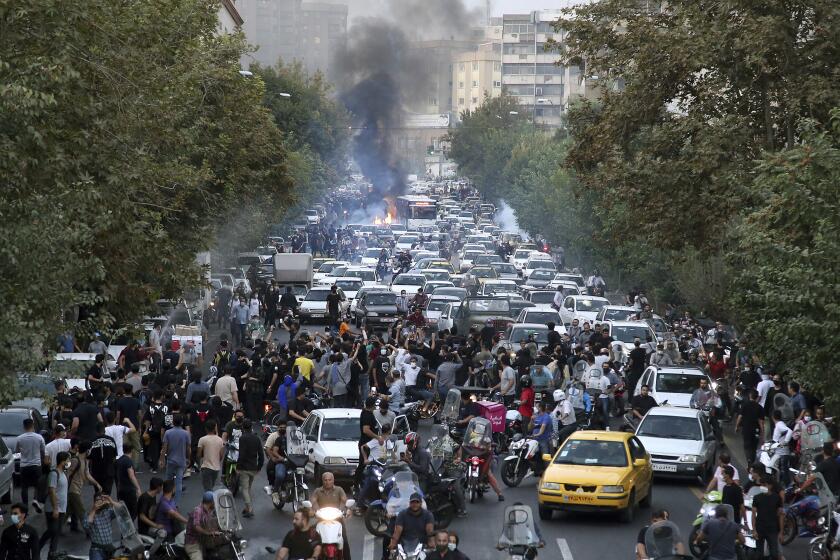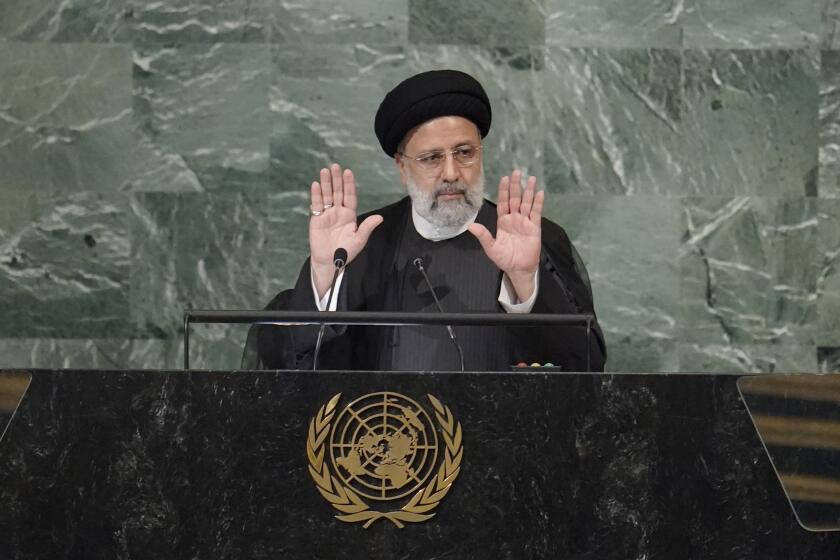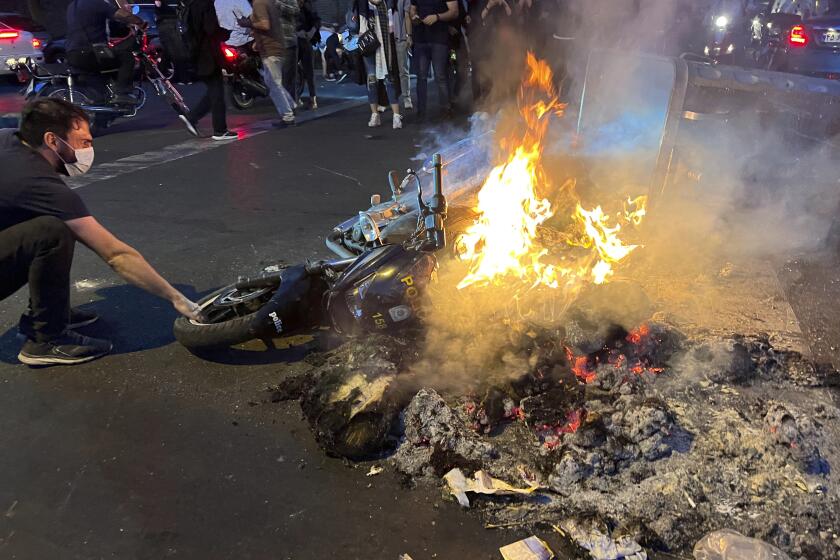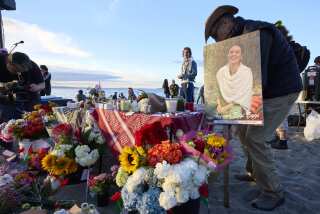From Tehran to Los Angeles, the death of an Iranian woman sparks a feminist outcry
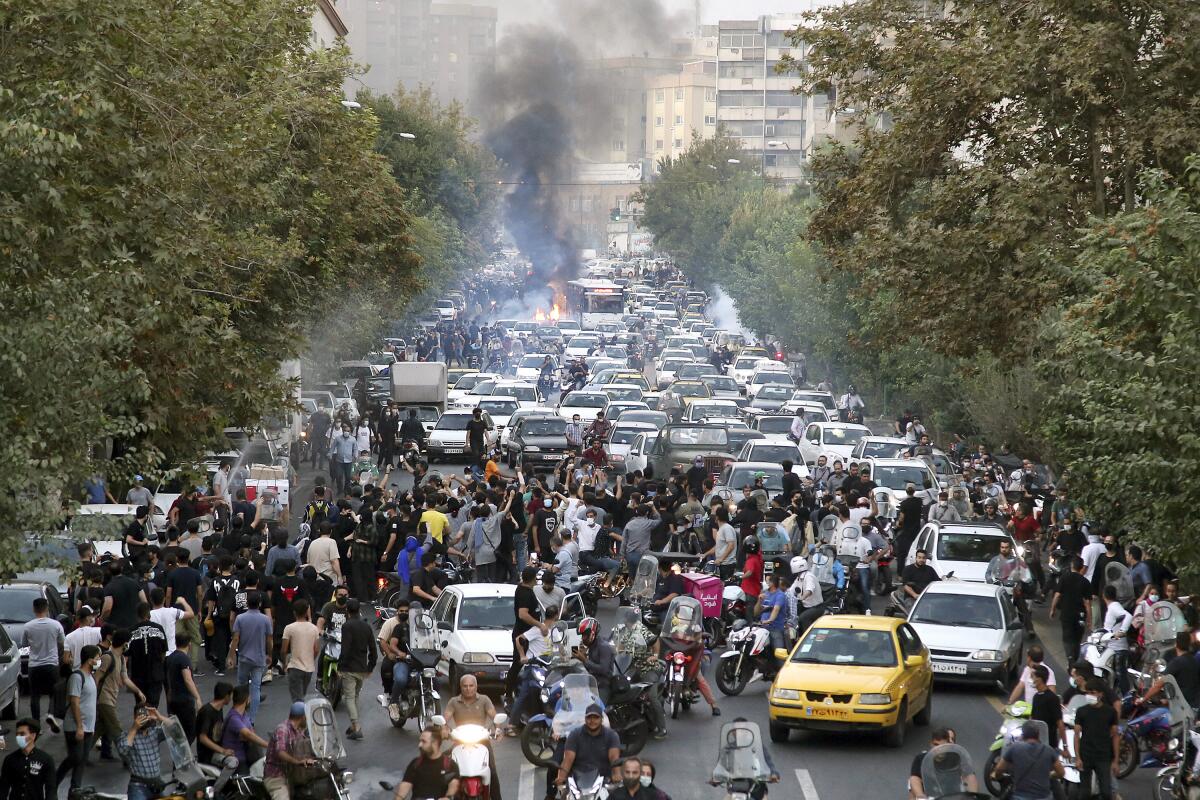
- Share via
Newsha was born and raised in Iran and moved to the U.S. when she was 17 years old. In recent days, her thoughts have focused on another young woman who lived in Iran — and whose death has touched a global nerve.
Mahsa Amini, 22, died last week after she was detained by Tehran’s morality police, accused of not wearing her hijab properly. Days of street protests in numerous Iranian cities have turned deadly as protesters have burned their headscarves and cut off their hair in defiance of strict dress codes.
“It’s a matter of feminism. Everyone should understand that women are fighting for their freedom,” said Newsha, one of hundreds of protesters who gathered outside the Wilshire Federal Building in Westwood on Wednesday night. She did not wish to be identified by her last name because she has family in Iran.
“They’re going down the street trying to protest, and they’re being shot down,” she said of people in Iran. “If you see the videos over there, they don’t care if you’re a woman or not; they don’t care if you have a hijab — they just want to crush you down.”
Clashes between Iranian security forces and protesters angry over the death of a 22-year-old woman in police custody have killed at least nine people.
The hijab, a head covering worn by some Muslim women, has been mandatory in Iran since the 1979 revolution. The United Nations Human Rights Council says that Iran’s morality police have been cracking down on women they accuse of not wearing the hijab properly, the Associated Press reported.
According to the U.N. body, videos have surfaced showing women being hit with batons, thrown into police vans and slapped in the face for not completely covering their hair.
Amini was born in Saqqez in western Iran and was traveling to Tehran with her family when she was arrested Sept. 13. She died three days later. Police have denied that Amini was mistreated and say she died of a heart attack, while her family has said she didn’t have a heart condition and was healthy, several media outlets have reported.
Independent experts connected with the U.N. have said Amini was beaten by the morality police, but haven’t provided evidence. The U.N. human rights office has called for an investigation into her death.
“Iran’s security forces will continue to feel emboldened to kill or injure protesters and prisoners, including women arrested for defying abusive compulsory veiling laws, if they are not held accountable,” said Diana Eltahawy, Middle East deputy director for Amnesty International, in a statement Wednesday.
Speaking at the U.N. on Wednesday, Ebrahim Raisi accused the West of ‘double standards’ on human rights.
Los Angeles is home to the most people of Iranian descent outside Iran. Many live in Tehrangeles, a Persian enclave in Westwood that began in the 1960s and boomed after the 1979 revolution. There were 87,000 people of Iranian ancestry in the city in 2019, according to Census Bureau figures.
Many in the community are now taking to the streets of L.A. in solidarity with protests against Amini’s death around the globe.
“Similar to George Floyd and what happened here in the U.S., the people in Iran are just fed up and they want women to have their rights,” said Jon Asghari, who lived in Iran as a child but moved to the U.S. about 15 years ago. The 28-year-old said it was just the “minimum” to show up at Wednesday’s protest and help “spread the word.”
Ariana Siddiq, 22, said Amini’s death was especially troubling because it could happen to any woman in Iran.
“I could’ve been visiting Iran and my hijab could’ve been slightly falling off and I could’ve been killed in Iran,” she said during the protest. “If that happened, then America would be doing something about it since I’m an American citizen.”
In the ongoing unrest between protesters and Iranian security forces, at least nine people have been killed since demonstrations began over the weekend, the AP reported Thursday. The protests coincide with President Ebrahim Raisi’s visit to New York for the U.N. General Assembly.
Iranians have reported widespread internet blackouts after the country blocked access to Instagram and WhatsApp and shut off internet entirely in portions of Tehran and Kurdistan in an attempt to repress growing dissent, the Guardian reported.
Raisi attempted to deflect the outrage over Amini’s death while speaking Wednesday to the U.N. General Assembly. He referenced the migrant children detained in the U.S. and the hardships faced by Palestinians.
“Human rights belongs to all, but unfortunately, it is trampled upon by many governments,” Raisi said.
Iran is facing international criticism over the death of a woman held by its morality police, which ignited three days of protests across the country.
Emily Doyle, 23, whose mother was born in Iran, said she struggles with speaking out against Iran because she’s concerned about the negative view many Americans have of Iranians. But ultimately, she believes it’s important to stand up for women’s rights.
“[Iran doesn’t] have any internet right now,” Doyle said. “They took away Instagram, and now I think the internet is out in Iran. That’s part of why being here is important, because we do have internet and we can continue spreading the message of what is happening.”
Siddiq emphasized that Iranians in America should speak out because they have more freedom to protest.
“It just shows that we need to be the ones doing it,” she said. “We’re less likely to be killed than in a country like Iran. Women are getting killed for protesting. If you’re in the States and able to protest, you might as well. If they don’t have a voice right now, we need to be their voice.”
Newsha said she understood how it felt to “be oppressed” and “damned by your society as a woman” because she had attended an all-girls school in Iran and had to adhere to a strict dress code, including being required to wear a hijab and to cut her nails to a certain length.
“I want to be there,” she said of Iran. “I want to get out and I want to show my hair, and I want to be the person who burns their headscarf. When I see women without hijabs in front of the police knowing that they’re going to get beaten at some point, that’s inspiring and brave. They’ve come to the point of desperation that they have to just stand there and say, ‘Hey look at me. I’m without hijab, and I’m here for my human rights.’
“This had to happen at some point, and now it’s happening, and I’m really happy for them,” Newsha added. “I’m also really sad because it’s not happening for free. They’re putting in a lot of sacrifices over there.”
More to Read
Sign up for Essential California
The most important California stories and recommendations in your inbox every morning.
You may occasionally receive promotional content from the Los Angeles Times.
